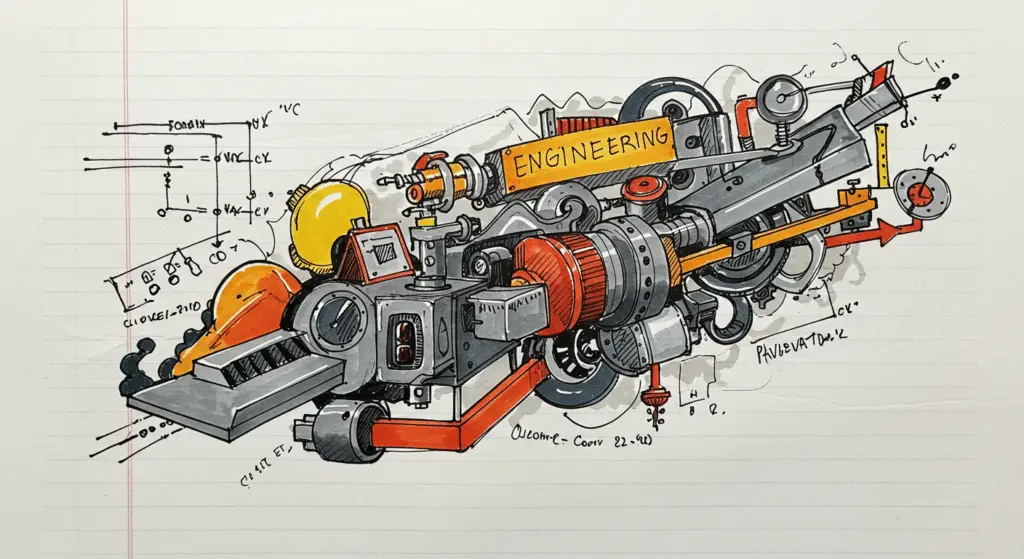How many sectors are there in engineering?

engineering
Engineering, as a field, is renowned for its breadth and diversity, encompassing a wide range of specialized disciplines and sectors that collectively drive innovation, solve complex problems, and shape the world around us. From the towering skyscrapers that define our urban landscapes to the cutting-edge medical devices that save lives, the contributions of engineers are woven into the fabric of modern society, touching virtually every aspect of our lives.
At the heart of this dynamic and multifaceted profession lies a tapestry of distinct engineering sectors, each one addressing a unique set of challenges and contributing to the advancement of specific industries or domains. Understanding the key sectors within the engineering landscape is crucial for aspiring professionals, as it allows them to identify their areas of interest, align their skills and expertise, and chart a fulfilling career path that aligns with their passions and the evolving needs of the world.
In this comprehensive article, we will explore the major sectors that comprise the engineering world, examining the defining characteristics, core responsibilities, and emerging trends of each domain. By delving into this diverse landscape, readers will gain a deeper appreciation for the breadth and versatility of the engineering profession, and the myriad of opportunities that await those who choose to embark on this dynamic and rewarding career path.
Civil Engineering

Civil engineering, often considered the oldest and broadest of the engineering disciplines, is primarily focused on the design, construction, and maintenance of the physical infrastructure that supports our communities and enables economic and social development. This includes the planning and development of transportation networks, buildings, water systems, and other vital public works projects.
At the core of civil engineering lies a deep understanding of structural analysis, geotechnical engineering, environmental sustainability, and project management. Civil engineers are responsible for ensuring the safety, functionality, and resilience of the built environment, addressing challenges such as traffic congestion, aging infrastructure, and the need for sustainable development.
As the world grapples with the impacts of climate change and rapid urbanization, the role of civil engineers in developing innovative solutions for transportation, water management, and green building has become increasingly crucial. By embracing emerging technologies, such as Building Information Modeling (BIM) and smart city infrastructure, civil engineers are driving the evolution of the built environment, ensuring it meets the evolving needs of society.
Mechanical Engineering

Mechanical engineering, often considered the “backbone” of the engineering profession, is focused on the design, development, and optimization of mechanical systems, devices, and processes. This encompasses a broad range of applications, from the design of vehicles and aircraft to the development of robotic systems and energy-efficient technologies.
Mechanical engineers draw upon their expertise in areas such as thermodynamics, fluid mechanics, materials science, and control systems to create innovative solutions that improve the performance, efficiency, and reliability of mechanical systems. They play a vital role in the development of cutting-edge technologies, including renewable energy systems, advanced manufacturing techniques, and next-generation transportation solutions.
As the world moves towards a more sustainable future, mechanical engineers are at the forefront of developing eco-friendly technologies, such as electric vehicles, renewable energy systems, and energy-efficient industrial processes. Additionally, the rise of Industry 4.0 and the increasing integration of automation and robotics have created new opportunities for mechanical engineers to push the boundaries of what is possible.
Electrical Engineering

Electrical engineering, the discipline responsible for the generation, transmission, and utilization of electrical energy, has been at the heart of the digital revolution that has transformed our world. Electrical engineers are essential in the design, development, and implementation of a wide range of electronic systems, from power grids and telecommunications networks to microprocessors and smart devices.
By applying their expertise in areas such as circuit design, control systems, signal processing, and power electronics, electrical engineers have played a pivotal role in the development of cutting-edge technologies that have revolutionized the way we live, work, and communicate. From the advent of the internet and the widespread adoption of smartphones to the growing prominence of renewable energy and the rise of artificial intelligence, the contributions of electrical engineers have been instrumental in shaping the technological landscape.
As the world becomes increasingly interconnected and dependent on digital infrastructure, the demand for skilled electrical engineers is expected to remain high. These professionals will be instrumental in developing the next generation of smart grids, renewable energy systems, and advanced communication networks, ensuring that the digital revolution continues to enhance our lives and create new opportunities for growth and innovation.
Chemical Engineering

Chemical engineering, the discipline that applies the principles of chemistry, physics, and biology to the design, development, and optimization of industrial processes and products, has been a driving force behind many of the transformative innovations that have defined the modern era.
Chemical engineers play a crucial role in the production of a wide range of materials, from pharmaceuticals and fuels to plastics and specialty chemicals. By leveraging their expertise in areas such as reaction engineering, process control, and materials science, these professionals are responsible for developing the efficient, sustainable, and cost-effective manufacturing processes that underpin the global economy.
As the world grapples with the challenges of resource scarcity, environmental sustainability, and the growing demand for innovative products, the role of chemical engineers has become increasingly vital. These professionals are at the forefront of developing advanced materials, renewable energy technologies, and sustainable production methods that can help address pressing global issues, such as climate change, healthcare, and food security.
Computer Engineering

Computer engineering, the discipline that combines the principles of electrical engineering and computer science, has been at the heart of the digital revolution that has transformed nearly every aspect of our lives. Computer engineers are responsible for the design, development, and implementation of the hardware and software systems that power modern computing devices, communication networks, and embedded systems.
By applying their expertise in areas such as digital logic, computer architecture, software engineering, and systems integration, computer engineers have played a critical role in the development of a wide range of cutting-edge technologies, from smartphones and cloud computing platforms to autonomous vehicles and the Internet of Things (IoT).
As the world becomes increasingly reliant on digital infrastructure and the demand for sophisticated, interconnected systems continues to grow, the role of computer engineers will become even more crucial. These professionals will be instrumental in developing the next generation of artificial intelligence, quantum computing, and cybersecurity solutions, ensuring that the digital future is secure, efficient, and responsive to the evolving needs of society.
Emerging Engineering Sectors
While the traditional engineering sectors outlined above continue to play a pivotal role in shaping the world around us, the engineering landscape is constantly evolving, giving rise to new and emerging domains that address the pressing challenges of the modern era.
Biomedical Engineering:

As advancements in healthcare and medical technology continue to transform the way we approach and manage our well-being, the demand for skilled biomedical engineers has grown exponentially. These professionals are responsible for developing innovative medical devices, prosthetics, and implants that can improve patient outcomes and revolutionize the delivery of healthcare services.
Sustainability and Environmental Engineering:

With the growing emphasis on sustainability, environmental preservation, and the mitigation of climate change, the role of engineers in addressing these critical issues has become increasingly prominent. Sustainability and environmental engineers are tasked with developing innovative solutions for renewable energy, waste management, water resources, and ecosystem conservation, driving progress towards a more sustainable and resilient future.
Robotics and Autonomous Systems Engineering:

The rapid advancement of autonomous technologies, such as self-driving vehicles, drones, and industrial robots, has created a surge in demand for engineers who can design, develop, and integrate these sophisticated systems. Robotics and autonomous systems engineers are responsible for enhancing the capabilities, safety, and reliability of these technologies, while also ensuring their ethical and responsible deployment.
As the world continues to evolve and new challenges emerge, the engineering profession will continue to expand and diversify, creating new and exciting opportunities for professionals to apply their knowledge, skills, and passion to drive progress and positively impact the world around them.
Conclusion
The engineering landscape is a richly diverse and dynamic tapestry, encompassing a wide range of specialized sectors that collectively shape the modern world. From the foundational disciplines of civil, mechanical, electrical, and chemical engineering to the emerging fields of biomedical, sustainability, and autonomous systems, the breadth and versatility of the engineering profession are truly remarkable.
As the world grapples with complex, multifaceted challenges, the role of engineers in developing innovative, evidence-based solutions will become increasingly crucial. By mastering the specific skills and expertise required within each engineering sector, professionals can not only contribute to the advancement of their respective fields but also play a vital role in addressing the grand challenges of our time, from climate change and resource scarcity to healthcare and technological disruption.
Whether aspiring engineers choose to pursue a career in the traditional sectors or explore the exciting frontiers of emerging domains, the opportunities for growth, impact, and fulfillment within the engineering profession are boundless. By embracing the diversity of this dynamic field and continuously expanding their knowledge and capabilities, engineers can unlock new frontiers of progress, drive positive change, and leave an indelible mark on the world around them.
- https://worldcivilsociety.com/which-engineer-will-be-in-demand-in-2030/
- https://worldcivilsociety.com/what-are-the-big-5-types-of-engineering/
- https://worldcivilsociety.com/navigating-the-engineering-design-process-a-comprehensive-guide-to-innovative-problem-solving/
Pingback: Navigating the Engineering Landscape: Determining the “Best” Type of Engineering – worldcivilsociety.com
Pingback: Which engineering has the highest salary? – worldcivilsociety.com